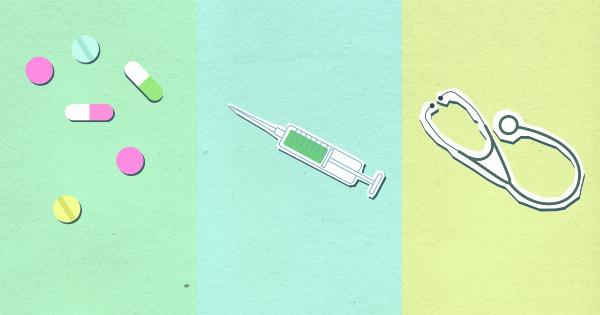Depression is a mental health condition that affects millions of people around the world. It is a complex disorder with various factors contributing to its development and persistence.
Over the years, researchers have explored numerous theories to understand the underlying mechanisms of depression and develop effective treatment options. One of the prominent theories that has gained significant attention is the role of serotonin in depression.
What is Serotonin?
Serotonin, also known as 5-hydroxytryptamine, is a neurotransmitter that plays a crucial role in regulating mood, emotions, and overall well-being. It is primarily found in the gastrointestinal tract, blood platelets, and the central nervous system.
Serotonin is involved in a wide range of physiological functions, including sleep, appetite, memory, and sexual desire.
The Serotonin Hypothesis of Depression
The serotonin hypothesis of depression proposes that a deficiency or dysfunction in serotonin neurotransmission leads to depressive symptoms.
This theory suggests that low levels of serotonin impair communication between nerve cells in the brain, causing mood disturbances and other symptoms associated with depression.
Evidence Supporting the Serotonin Theory
Several lines of evidence support the serotonin theory of depression. Firstly, selective serotonin reuptake inhibitors (SSRIs), a class of antidepressant medications, have been found to increase serotonin levels in the brain.
These medications are widely prescribed and have shown effectiveness in alleviating depressive symptoms in many individuals. Furthermore, reducing serotonin levels through certain medications or dietary changes has been associated with the onset of depressive symptoms in some cases.
Additionally, postmortem studies on individuals with depression have indicated reduced levels of serotonin and its metabolites in certain brain regions. These findings suggest a potential link between serotonin abnormalities and depressive disorders.
However, it is important to note that brain chemistry is incredibly complex, and serotonin is just one piece of the puzzle in understanding depression.
The Role of Serotonin Transporter Gene
Scientists have also investigated the role of a specific gene called the serotonin transporter gene in depression. This gene encodes a protein responsible for the reuptake of serotonin from the synaptic cleft back into the nerve cells.
Variations in this gene, such as the short allele of the serotonin transporter gene promoter region (5-HTTLPR), have been associated with an increased risk of depression.
Individuals with the short allele tend to have reduced serotonin reuptake, leading to increased serotonin availability in the synaptic space.
Interestingly, studies have suggested that individuals with the short allele may be more susceptible to the influence of environmental stressors, which can trigger the onset of depression.
The Limitations of the Serotonin Theory
While the serotonin theory of depression has influenced the development of various antidepressant medications, it is essential to recognize its limitations.
Depression is a multifaceted condition that involves various biological, psychological, and social factors. Serotonin abnormalities may be one piece of the puzzle, but they do not account for the entire complexity of depression.
Many individuals with depression do not respond well to SSRIs or other medications that directly target serotonin function, indicating that serotonin alone is not the sole cause of the disorder.
Moreover, the serotonin theory does not explain why it takes several weeks for antidepressant medications to alleviate symptoms, as serotonin levels typically rise soon after starting treatment.
A Broader Understanding of Depression
To gain a comprehensive understanding of depression, it is crucial to consider the interconnected nature of biological, psychological, and social factors.
Various neurotransmitters, in addition to serotonin, are involved in mood regulation and may contribute to depressive symptoms when imbalanced. These neurotransmitters include norepinephrine, dopamine, and gamma-aminobutyric acid (GABA), among others.
Furthermore, factors such as genetic predisposition, early life experiences, trauma, chronic stress, and social support play significant roles in the development and course of depression.
It is the interplay between these factors and neurotransmitter abnormalities that likely give rise to the complex and heterogeneous nature of depressive disorders.
Treating Depression Holistically
Given the diverse factors contributing to depression, a holistic approach to treatment is often recommended. While medications targeting serotonin may be beneficial for some individuals, they may not be sufficient on their own.
Psychotherapy, such as cognitive-behavioral therapy (CBT), interpersonal therapy (IPT), or psychodynamic therapy, has been proven effective in treating depression.
Lifestyle modifications, including regular exercise, a balanced diet, sufficient sleep, and stress reduction techniques, can also have a positive impact on depressive symptoms.
Additionally, social support networks, engaging in meaningful activities, and finding a sense of purpose can contribute to overall well-being and aid in overcoming depression.
The Future of Depression Research
While the serotonin theory has played a significant role in understanding depression and developing treatment options, researchers continue to explore other potential mechanisms.
Advancements in brain imaging techniques, genetics, and molecular biology are shedding new light on the complex interplay of factors involved in depression.
Future research may uncover novel targets for intervention and identify personalized treatment approaches based on an individual’s unique biological and psychosocial profile.
By expanding our understanding beyond serotonin, we can hope to develop more effective and tailored treatments for individuals with depression.






























